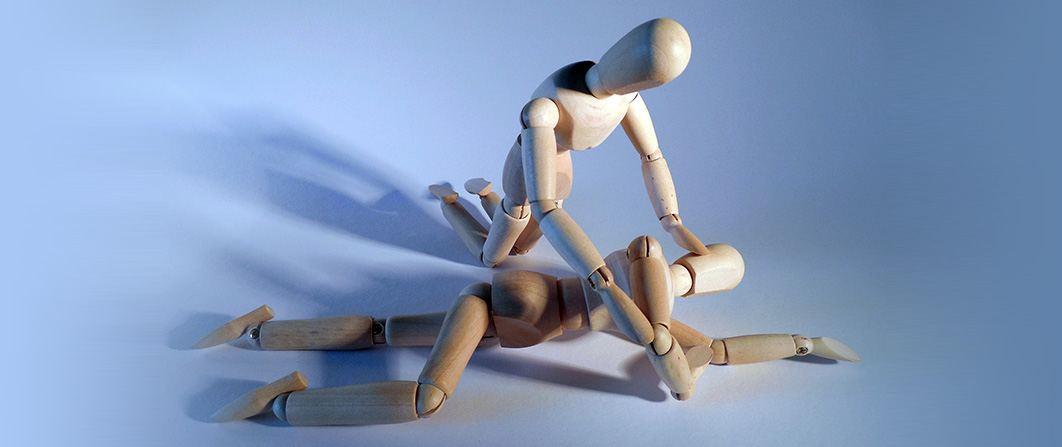You will find here:
- How to react when someone has passed out on G - DO'S AND DONT'S
- What to do when someone is having a Tina/Meph overdose
- What can I do if I am having a psychotic episode (paranoia, etc)
- What can I do if someone else is having a psychotic episode
- What to do if an object is lodged or experiencing a priapism (long lasting erections)
It is a reality that we are all vulnerable, and obviously much more when we are under the influence of drugs. Sometimes things go wrong in a Chemsex scenario, and we are not sure about what to do because there are lots of myths about how to react in many different situations, and sometimes we even don’t know if we should call an ambulance or not.
Knowing about how to react in those situations, will help to keep ourselves and the people who we are playing with safe. If you are the one who is in danger, we are sure that you would like those who are around you to have an idea about what to do, and if it’s someone else, this information will help you to deal with that as well.
THIS IS HIGHLY IMPORTANT, this information is saving lives, and it can be yours that it has saved, or you can be the one who saves someone elses. We are offering accurate, reliable and very practical information about how to react when things go wrong in a chemsex session. Please feel free to spread it, as it is for your own safety, and others.
1: WHAT TO DO WHEN SOMEONE HAS PASSED OUT ON G
Perhaps you are very familiar with G overdoses, and sometimes because of this reason, it’s not unusual that we lose perspective regarding the dangers that are associated. We can’t forget that when someone is passing out, many times they might be all over the place and it’s impossible to make them take care of themselves, being at risk of suffering from an accident that can bring very serious consequences. Also, losing consciences and falling asleep is something that maybe we have seen so many times that we are not really aware of how dangerous this can be, precisely because we have seen this happening all the time, and there were no fatal results.
There are some DO’s and DON’Ts to take into account if someone is experiencing an overdose:
- DO KEEP THEM SAFE WITHIN THE ENVIRONMENT: They can harm themselves accidentally, hitting their head, falling down, etc.
- DO WAKE THEM IF THEY ARE SLEEPING: It happens all the time that someone who falls asleep goes into a coma, and sometimes they might stop breathing. Nearly all of deaths occur while people are in a G-sleep
- DO CALL AN AMBULANCE: If someone under G is mobile/responsible and their breathing is OK, it may not be necessary to call an ambulance, but if you see they are having a seizure or their high is causing them to behave in a way (or those around them) that is unsafe, call the emergency services. When emergency services arrive, it can be really helpful to tell them what drugs have been taken, how much and how recently, if you know. In cases that you are not sure if you should call them, call them anyway and discuss it with a trained person who often takes phone calls similar to your concerns and they will help you to decide what is best.
- DO BE MINDFUL OF CONSENT ISSUES: There is a point where the G-high surpasses ones ability to consent. If you see that someone under G is not responding to your direct questions, if you can’t get their attention of if they are too intoxicated to acknowledge you, then it is likely they are unable to consent, and in those cases:
- DO STOP ANY SEX THAT MIGHT BE HAPPENING
- DO STOP ANY FILMING/TAKING PICTURES
- DO STOP ANYONE FROM GIVING THEM MORE DRUGS OR LIQUIDS
- DO STOP THEM FROM USING THEIR PHONE, TO PREVENT THEM FROM SENDING EXPLICIT PICTURES OR MESSAGES THAT THEY MIGHT REGRET AFTERWARDS
- DON’T INDUCE VOMITING: These cases are different than when someone is drunk and they carry other risks to do with aspiration, breathing, infection of the lungs, choking. Vomiting can be a helpful thing when the body does it naturally (and that should never be prevented if it occurs), but forcing a vomiting episode upon oneself (or someone else) is a violent thing to do to the stomach, esophagus and airway, and is not advised in a chemsex environment.
- DON’T GIVE THEM ANY MORE DRUGS: Despite the myths that we have heard many times regarding giving some stimulant (Tina, Mephedrone, etc) to someone who is passing out on G, what we would actually be doing is to add more toxicity into their system, and toxicity is what is causing the problem. Perhaps this seemed to work in the past, but be aware that the negative consequences outweigh the positive consequences, so best not to.
- DON’T GIVE THEM ANY LIQUID unless they are thirsty and is asking you to drink. Liquid can accelerate the movement of the drug from the stomach, to the bloodstream, and the effects might not be what we want.
THERE ARE SOME SCENARIOS THAT MIGHT HAPPEN:
* WHAT TO DO IS SOMEONE IS ASLEEP ON G, BUT WAKEABLE:
Breathing can stop at any time when a person is in a G-sleep. There might be some warning signs of problematic breathing, or abrupt snoring, but not always. An ambulance should be called if breathing slows to less than eight breaths a minute.
Although many people do awake naturally from a G-sleep, you cannot guarantee if the person you are with will be that lucky. Wake them up, and keep them awake. If you’re unable to keep them awake, don’t just let them sleep it off; always call an ambulance, you will not be wasting anybody’s time, and you could save a life. A reminder that in London, a person dies in a G-sleep every month.
If they can be woken, and kept awake and observed, great. If they are unresponsive, always always call an ambulance. Save a life.
* WHAT TO DO IS SOMEONE IS UNWAKEABLE/UNCONSCIOUS:
Don’t leave them unattended and CHECK IF THEY ARE RESPONSIVE. Can you wake them, by shaking them a little? A lot? Try firmly squeezing their trapezius muscle (that’s the muscle in the shoulder). If that doesn’t wake them, they are ‘unresponsive’. Call an ambulance.
To CHECK HOW THEIR BREATHING IS, move the person onto their side and tilt the head back to clear the airway.
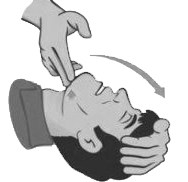
Check for normal breathing: look, listen, feel.
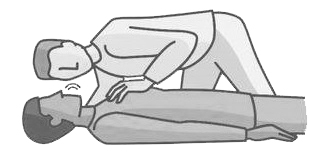
IF THEY ARE NOT BREATHING, call an ambulance and start CPR (Cardiopulmonary Resuscitation), which is an emergency procedure while you wait for the ambulance to arrive, consisting of mouth-to-mouth respiration and chest compressions by pushing firmly with both hands on their chest and then releasing. Place the heel of one hand in the center of their chest and place your other hand on the top of the first. Interlock your fingers. Then, with straight arms, use the heel of your hand to push the breastbone down firmly and smoothly, so that the chest is pressed down between 5-6 cm and release. Do this at a rate of 100 to 120 compressions per minute (around 2 per second). Then, give them 2 rescue breaths mouth to mouth, and repeat until the ambulance arrives.
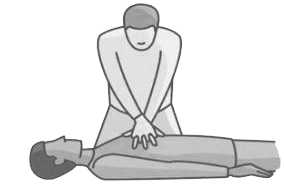
IF THEY ARE BREATHING, put them in the RECOVERY POSITION to prevent problems if they vomit and to facilitate breathing. Don’t leave them unattended and if their breathing is irregular or interrupted, or if it slows to less than 8 breaths a minute, call an ambulance
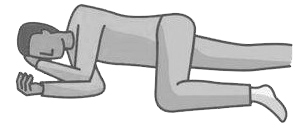
2: WHAT TO DO WHEN SOMEONE IS HAVING A TINA/MEPHEDRONE OVERDOSE
The high from Tina or Meph is not like the high from G; a person who is very high on Meth or Mephedrone is usually very alert, aware of what is happening around them, so (possibly) less likely to be vulnerable to clumsiness, falls, cuts and scrapes that a G-high can cause. Being very high on Meth or Meph might result in manic behaviour, panic attacks, hyperactivity, or behaviour from a person who feels invincible or invulnerable to harm; which of course might lead to harm occurring.
There are some DO’s and DON’Ts to take into account if someone is too high on Meth or Meth:
- DON’T GIVE THEM ANY MORE DRUGS: Despite the myths that we have heard many times regarding giving some relaxant (G, Valium, Xanax …) who is too high on Tina, Mephedrone or any other stimulant. If you do, what you will actually be doing is adding more toxicity into their system, and toxicity is what is causing the problem. Don’t forget that maybe they had some G or took some Valium recently that you are not aware of, which will increase the chances of having an overdose.
- DO KEEP THEM SAFE WITHIN THE ENVIRONMENT: They can harm themselves accidentally, hitting their head, falling down, etc.
- DO CALL AN AMBULANCE: An intoxicated person who is mobile/responsive and breathing does not necessarily need an ambulance; but if their Meth/Meph high is causing them to behave in a way that is harmful to themselves, to you or others, and you can’t keep the person (or those around them) safe, call emergency services. In cases that you are not sure if you should do it, call them anyway and discuss with the person who takes the phone call about your concerns (and many others) and they will help you to decide what is best.
- DO BE MINDFUL OF CONSENT ISSUES: There is a point where the G-high surpasses ones ability to consent. If you see that someone under G is not responding to your direct questions, if you can’t get their attention of if they are too intoxicated to acknowledge you, it appears that they are unable to consent, and in those cases:
- DO STOP ANY SEX THAT MIGHT BE HAPPENING
- DO STOP ANY FILMING/TAKING PICTURES
- DO STOP ANYONE FROM GIVING THEM MORE DRUGS OR LIQUIDS
- DO STOP THEM FROM USING THEIR PHONE, TO PREVENT THEM FROM SENDING EXPLICIT PICTURES OR MESSAGES THAT THEY MIGHT REGRET AFTERWARDS
3: WHAT CAN I DO IF I AM HAVING A PSYCHOTIC EPISODE (Paranoia, etc.)
 If you are experiencing a psychotic episode (paranoia, hallucinations, etc.), it’s hard to stop it, especially if you are 100% convinced that it’s real, that it’s not psychosis. Once it sets in, it is likely to stay with you until you sleep it off; that’s just the nature of it. Meth especially lasts a really long time in our body, and a big part of the problem is lack of sleep, so it is unlikely to improve while the session continues. Getting somewhere safe and sleeping it off is the best method.
If you are experiencing a psychotic episode (paranoia, hallucinations, etc.), it’s hard to stop it, especially if you are 100% convinced that it’s real, that it’s not psychosis. Once it sets in, it is likely to stay with you until you sleep it off; that’s just the nature of it. Meth especially lasts a really long time in our body, and a big part of the problem is lack of sleep, so it is unlikely to improve while the session continues. Getting somewhere safe and sleeping it off is the best method.
But there are more things you can do:
Try to spot it early, early warning signs might be:
- Feeling self-conscious.
- Feeling that you are the least welcome person in an environment.
- Doubting or double-thinking what a person really means with every sentence they say.
- An anxious feeling (rather than an enjoyment of the ’high’).
- Obsessive thoughts about things like getting an erection, or the last text you received, or a blemish on your face, or past traumas, or about all the things that could go wrong.
What to do once you identify you’re experiencing psychosis;
- Get somewhere where you feel safe. Home is always best if you feel safer there, but if you feel you are really in immediate or urgent danger, don’t hesitate to call 999 even if you are high or on drugs, Their job is to protect you.
- Distraction is the absolute best thing we can do for ourselves in this state; that’s because the psychosis is mostly driven by an obsessive and anxious thought pattern. Obviously the first thing is to stop taking any more chems and to get some sleep, but sleeping can be challenging for a while. If that is the case, calming or joyous music that we love can be helpful, cleaning the house or doing some gardening, or why not a relaxing bath with candles, or a long shower. Eating and having a hot drink always helps as well.
- Technology doesn’t help when having a psychotic episode, so it’s better to switch off your phone, laptop, etc. Remember that many times, technology is what triggers these feelings of insecurity.
- Muscle relaxants/sleeping pills like Valium can be really helpful at times like this. Or a fast acting anti-psychotic like Quetiapine. Some people have reported that hypnotic type sleeping pills (Zopicline, Zolpidem) can exacerbate the hallucinations, make it worse, so a benzodiazepine might be a better option; but be careful; if you’ve done lots of GHB/GBL, Benzodiazepines (like Valium, Diazepam) can increase the chance of overdose, and some people, in a panic, might take too much Valium. Many G overdoses and deaths have been caused by psychotic people trying urgently to calm down. Take one pill, then give it time to work. Help it to work; create a calming environment and mood for yourself.
4: HELPING SOMEONE ELSE WHO IS HAVING A PSYCHOTIC EPISODE
- Be yourself, they need to trust you and you need to make them feel safe and relaxed. Be gentle and calm and speak slowly and simply.
- Make them comfortable to share what they are experiencing. Listen non-judgmentally and try to understand them.
- Call the person’s name. Talk to the individual, and try to get them to respond and communicate as much as possible.
- Ask them what you could do to helpt hem. Stay positive.
- Focus on their feelings in what they say, not on the facts of what they are actually saying.
- Give them your full attention, be aware of your body language, etc.
- Empathize with their situation “I would be terrified as well if all my devices were hacked!”
- Ask about things you know they enjoy.
- Take any threats or warnings seriously. If you are concerned about safety, then you may need to call 999.
DONT'S
- Don’t threaten them. They will not feel safe.
- Try to rationalize them out of their behavior, this is not likely to work.
- Avoid criticizing or blaming them for their psychosis or the actions related to their psychosis.
- Avoid touching the person without permission, even to give comfort.
- Avoid denying or arguing with them about their reality. Don’t forget that for them it’s real even if it doesn’t make any sense.
- Don’t take what they say personally. At that moment they are questioning everything, even the relationship that they have with you, so don’t get angry.
- Do not directly confront them.
- Don’t tell them that they are psychotic.
- Do not use sarcasm and avoid using patronizing statements
- Do not dismiss their concerns or laugh it off.
- Do not encourage their psychosis by confirming it. You don’t need to comment directly.
- Don’t try and take over or make decisions without them.
5: WHAT TO DO IF OBJECT LODGED OR PRIAPISM (LONG LASTING ERECTION)
Sometimes, objects might become lodged in the anus, and we might have some difficulty removing them. Clenched muscles, anxiety, or an inability to relax associated with chems can make this more difficult. If some hours have passed, and relaxing or sitting on the toilet has not helped, it might be necessary to go to Accident & Emergency (A&E). (General Practitioners, or Doctors’ offices do not always have the right equipment to assess the danger, or to remove the object; A&E department would be the right place to go.
If the object is not something designed to be used in the rectum; if it is something that could break, or cause damage to the rectum, it might be more of an emergency situation. If the lodged object is accompanied by other symptoms such as abdominal pain, rectal bleeding, nausea or fever, then go to A&E as soon as possible. Although it’s embarrassing, this is more common to emergency services than you might think. And punctures within the anus from foreign lodged objects can be dangerous, so better to be safe than sorry; go to A&E as soon as possible, or call emergency services to discuss it (frankly) with them on the phone to help you decide what to do.
PRIAPISM OR LONG LASTING ERECTION
It can cause permanent damage to your penis if not treated quickly.
Priapism is not very common; it mostly commonly affects people with sickle cell disease. But it can result from mixing erectile function drugs (such as Viagra and Caverject) with chems for long sex sessions.
Priapism may get better on its own within 2 hours. There are things you can try to reduce your erection.
DO’S
- Switch off porn, change the mood of the environment you are in
- Try to go for a pee
- Have a warm bath or shower
- Drink lots of water
- Go for a gentle walk
- Try exercises, such as squats or running on the spot
- Take painkillers like Paracetamol if you need to
DONT'S
- Apply ice packs or cold water to your penis – this can make things worse
- Have sex or masturbate or try to ejaculate – it won’t make your erection go away
- Drink alcohol
- Smoke
Call 999 or go to A&E if you have an erection that lasts unstimulated for more than 2 hours.
An erection that lasts this long needs to be treated in hospital as soon as possible to help avoid permanent damage to the penis.
Hospital treatments to help reduce your erection include:
- tablets or injections directly into your penis
- using a needle to drain blood from your penis, done while the area is numbed under local anaesthetic
- surgery to drain the blood through a tiny cut, done while you’re asleep under general anaesthetic
* This document was created by David Stuart together with our CEO, Ignacio Labayen de Inza. We highly encourage you to have a read, you can access it if you you click on the following link www.davidstuart.org/chemsex-first-aid

